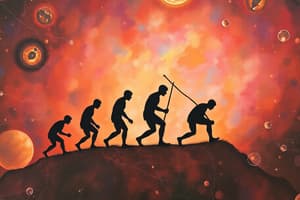Podcast
Questions and Answers
Which of the following concepts explains the stability of internal conditions in an organism?
Which of the following concepts explains the stability of internal conditions in an organism?
- Energy Processing
- Evolution
- Cell Theory
- Homeostasis (correct)
What is the basic unit of life according to Cell Theory?
What is the basic unit of life according to Cell Theory?
- Organ System
- Organ
- Tissue
- Cell (correct)
Which process involves the conversion of light energy into chemical energy?
Which process involves the conversion of light energy into chemical energy?
- Photosynthesis (correct)
- Reproduction
- Respiration
- Fermentation
Which of the following is NOT a branch of biology?
Which of the following is NOT a branch of biology?
What drives the process of evolution in biological sciences?
What drives the process of evolution in biological sciences?
Which term describes organisms that can produce their own food?
Which term describes organisms that can produce their own food?
Which process involves breaking down glucose to release energy?
Which process involves breaking down glucose to release energy?
In biological classification, what is the highest taxonomic rank?
In biological classification, what is the highest taxonomic rank?
Flashcards are hidden until you start studying
Study Notes
Overview of Biology
- Biology is the scientific study of life and living organisms.
- Key areas include structure, function, growth, evolution, distribution, and taxonomy.
Fundamental Concepts
-
Cell Theory
- All living organisms are composed of cells.
- The cell is the basic unit of life.
- All cells arise from pre-existing cells.
-
Homeostasis
- The ability of an organism to maintain stable internal conditions despite external changes.
-
Evolution
- Central to biological sciences, explaining the diversity of life.
- Driven by natural selection, genetic drift, mutation, and gene flow.
-
Energy Processing
- Organisms obtain energy to fuel their biological processes.
- Autotrophs (producers) vs. heterotrophs (consumers).
Levels of Biological Organization
- Molecules → Cells → Tissues → Organs → Organ Systems → Organisms → Populations → Communities → Ecosystems → Biosphere.
Major Branches of Biology
- Botany: Study of plants.
- Zoology: Study of animals.
- Microbiology: Study of microorganisms.
- Genetics: Study of heredity and variation.
- Ecology: Study of interactions between organisms and their environment.
- Evolutionary Biology: Study of the origins and changes in the diversity of life.
Biological Classification (Taxonomy)
- Organisms are classified into hierarchical categories:
- Domain
- Kingdom
- Phylum
- Class
- Order
- Family
- Genus
- Species
Basic Biological Processes
- Photosynthesis: Conversion of light energy into chemical energy by plants.
- Respiration: Process of breaking down glucose to release energy.
- Reproduction: Mechanism by which organisms produce offspring.
- Asexual (single parent) and sexual (two parents).
Genetics and Heredity
- DNA: Carries genetic information.
- Genes: Units of heredity located on chromosomes.
- Mendelian inheritance: Patterns of inheritance observed in pea plants by Gregor Mendel.
Importance of Biology
- Understanding living systems enhances knowledge of health, medicine, environment, and biodiversity.
- Addressing global challenges such as disease, climate change, and resource management.
Current Trends in Biology
- Genomics and biotechnology: Genetic engineering, CRISPR, synthetic biology.
- Conservation biology: Focus on preserving species and habitats.
- Environmental biology: Study of ecosystem dynamics and human impact.
Overview of Biology
- Biology studies life, focusing on structure, function, growth, evolution, distribution, and taxonomy.
Fundamental Concepts
- Cell Theory: All living things are made of cells, the basic unit of life, and all cells arise from pre-existing cells.
- Homeostasis: Organisms maintain stable internal conditions despite external changes.
- Evolution: Explains diversity of life through natural selection, genetic drift, mutation, and gene flow.
- Energy Processing: Organisms obtain energy for life processes; autotrophs make their own food, while heterotrophs consume other organisms.
Levels of Biological Organization
- Biological systems are organized: molecules, cells, tissues, organs, organ systems, organisms, populations, communities, ecosystems, and the biosphere.
Major Branches of Biology
- Botany: Study of plants.
- Zoology: Study of animals.
- Microbiology: Study of microorganisms.
- Genetics: Study of heredity and variation.
- Ecology: Study of interactions between organisms and their environment.
- Evolutionary Biology: Study of origins and changes in the diversity of life.
Biological Classification (Taxonomy)
- Organisms are categorized hierarchically: Domain, Kingdom, Phylum, Class, Order, Family, Genus, Species.
Basic Biological Processes
- Photosynthesis: Plants convert light energy into chemical energy.
- Respiration: Glucose breakdown releases energy.
- Reproduction: Organisms produce offspring; asexual involves a single parent, sexual involves two.
Genetics and Heredity
- DNA: Carries genetic information.
- Genes: Units of heredity located on chromosomes.
- Mendelian inheritance: Gregor Mendel's pea plant experiments revealed patterns of inheritance.
Importance of Biology
- Understanding biology enhances knowledge of health, medicine, the environment, and biodiversity.
- Biology helps address global challenges like disease, climate change, and resource management.
Current Trends in Biology
- Genomics and biotechnology: Genetic engineering, CRISPR, synthetic biology.
- Conservation biology: Focus on preserving species and habitats.
- Environmental biology: Studies ecosystem dynamics and human impact.
Studying That Suits You
Use AI to generate personalized quizzes and flashcards to suit your learning preferences.




